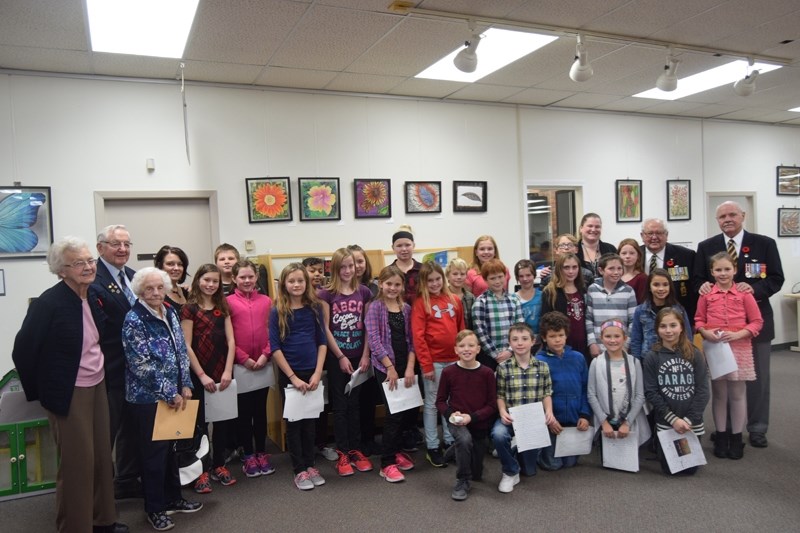It has become an annual tradition.
For the last five years, a week or two before Remembrance Day at the Barrhead Public Library, a Grade 5 Barrhead Elementary School (BES) class has had the opportunity to get together and talk with a group of Canadian Armed Forces (CAF) veterans over tea.
This year, on Nov. 2, it was Madame Kim Schapka’s class’ turn.
Elaine Dickie, library director, said the program is part of its Living Book program.
“Because that is what these individuals are, living books,” she said, adding it is an unfortunate reality that it is an opportunity that won’t be available to all future BES Grade 5 classes. “There will come a time when people who have first hand experiences about what happened during the wars will no longer be around.”
That is why after each class talks to the veterans, the students are asked to write a report or story about what they learned.
This year for the first time, the library invited two people, Elsie Measures and Madge Gummow, who did not serve with CAF.
However, they said that doesn’t mean they weren’t involved in the war (Second World War) effort.
“I was a child of nine when my brother, Aino John Carlson, went off to war,” Measures said. “I never took part in the war, but I honour the veterans and I remember my brother fondly. He was a real hero.”
Although Gummow wasn’t part of the CAF, what she did during the Second World War had a direct impact.
“I worked in a munitions factory in Toronto,” she said. “We made shells, bombs, depth charges, hand grenades and all that kind of bad stuff that the allied forces used to help win the war.
A student asked Gummow why she decided to get involved in the war effort.
She responded that like most Canadians at the time, she felt it was important to do what she could for the soldiers fighting the war and for the country.
Although John Barkemeyer and Gummow did not know each other directly he said he was familiar with the job she did.
“I served in the Royal Canadian Air Force for 38 years in a different type of war, the cold war,” Barkemeyer said, adding one of his duties serving in Germany and in North Africa was to help diffuse bombs. “After the war there were a lot of bombs that didn’t go off and I had to blow them up.”
Another veteran Herman Barkemeyer, John’s twin brother, spent 10 years in the CAF split evenly between the Air Force and the Army. He spoke about his experiences during the Korean War (1950-53).
“I volunteered when I was just a teenager thinking it would be an adventure and they sent us to Korea,” he said, adding they were told they would be going as a part of a peace keeping force and it would probably be over within a matter of months.
However, Herman said it didn’t take them long to realize that it was an actual war.
“We were fighting for Korean democracy, but China, a communist country did not want democracy so close to their borders and all of a sudden we were fighting thousands more soldiers who were better equipped than we were,” he said.
One student asked him what life was like as a soldier in Korea.
Herman replied that much of his time was spent in a trench or bunker, adding a lot of a soldier’s time was spent in a trench.
“We were told not to stick our heads out of the trench or we would be shot by a sniper,” he said, adding even though he was on the front lines in a trench soldiers were required to be clean shaven.
But since fresh water was in such demand, the soldiers used their left over cooking water.
“Sometimes we wouldn’t notice that we had a noodle stuck to our face,” Herman said.
Another student asked if he regretted his time in Korea and he said no.
“Korea is called the forgotten war, but not for me. It’s something I think about every day,” Herman said, adding his memories of the war were difficult to deal with.
But he said that changed in 2000 when he had a chance to go back to Korea and see first hand the results of what he and his comrades had fought for.
“When you see what a beautiful country it is and what the people have been able to build and accomplish in part because of what we did. No, I don’t regret my time in the Armed Forces,” he said, adding his time in the military also shaped him into what he is today.
Lyle Saumer, a Canadian Armed Forces Veteran who served with the Princess Patricia Light Infantry including two peace keeping tours in Cyprus, told the students he was proud to serve in the Canadian military.
“I believe, no I know that the Canadian soldier is the best trained soldier in the world,” Saumer said.
He also told the students how important it is to recognize the contribution Canadian soldiers have made for the nation.
“The best thing you can do for someone who served in the Canadian Armed Forces, especially those who served in the Second World War, Korea and Afghanistan is to go up and thank them for what they have done. It really means the world to them and it is something I tell my own grandchildren to do,” he said.



